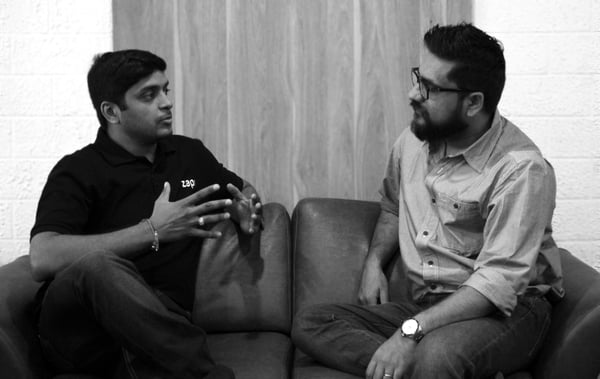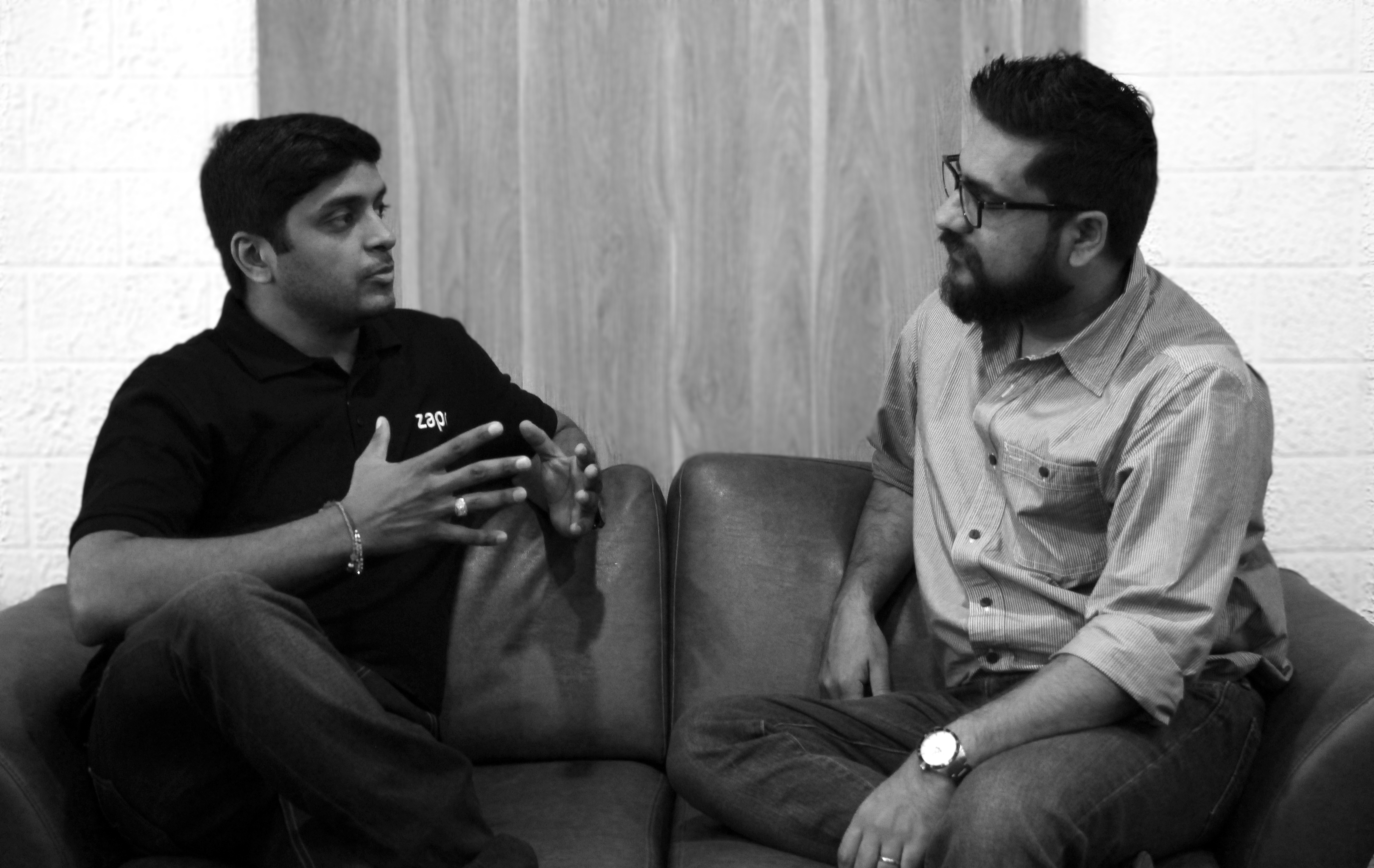Indian engineers have been at the receiving end of much vitriol in recent times: reports point out a lack in core engineering skills, largely questioning employability for the bulk of our graduates each year. Most recently, the new H-1B visa policies in the U.S bring further attention to the “quality” of the engineering sector in India, and the opportunities viable to our tech graduates.
No doubt it is increasingly difficult for Indian engineers to join the workforce today than it was five years back, but is the bigger concern finding the right kind of work? Compensation? Or just a big brand to be associated with?
On the first of our Fireside chats, Siddharth Agarwal (VP, Engineering) and Sharan Tulsiani (VP, Business Development) address some of the basic concerns that keep Indian engineers up at night.
Sharan: Siddharth, we've often had conversations while expanding your team on the challenges you've faced hiring quality engineers. One recurring theme is that a lot of engineers don't get the right kind of challenges to help them to build greater skill.
As head of Engineering, do you think the "right kind of work" is important?
Siddharth: Yes, very much. In fact, all good engineers should constantly think about that. I must admit, good challenging work is hard for anybody to find, be it freshers or engineering leaders or anyone else in between.
And this is directly connected to the core problems a company is trying to solve. Is it something that only technology can solve? Will the solution scale in different contexts? What sort of technological problems would one be solving in the future, say 10 years from now?
The key concern is whether a certain technology answers a real need in the industry. A tech company that passes this litmus test is surely offering a unique problem full of interesting challenges.
Sharan: Agreed! Scalable tech solutions to real industry problems are huge engineering challenges but are the only way we move forward. That’s where value is created and true innovations happen.
Siddharth: Let me add some more context to this point. In an earlier time in the media industry, brands and TV broadcasters would approach data agencies for market research. But they would receive only samples of those who possibly watched television and not actual consumption data of individuals. To people in the digital world like us, this might sound odd, because we’re used to everything being tracked and mapped. For such a huge industry like television, where billions of dollars spent in advertising rely on probabilistic data, there is definitely huge potential to gain more value from technology.
So here’s a good example about solving a real industry problem for tech startups. Over the last few years at Zapr Media Labs we’ve made fantastic progress solving this industry wide problem with granular TV viewership data for millions of users at a scale never attempted before in India.
Sharan: As a non-engineer, it always fascinates me that data can be mapped at such a scale, across a huge geography like India. Maybe it’s common in the tech world, but how complex or huge is this really? Is scale a challenge?
Siddharth: At Zapr we churn out data in the order of 100s of TeraBytes everyday. So the challenge here is to build infrastructure that can hold it all together, without compromising on the efficiency.
For us, engineering is a capability building machine rather than a pure automation machinery. As shared before by engineers like Chhavi and Agam, our team is solving massive new challenges while building these systems. Today we have 40+ million users in our platform profiled for their consumption of over 500+ channels, by analysing more than 1 billion signals on a daily basis. Our capabilities have grown massively in last couple of years, all by solving the right problems at the right time.

Siddharth (left) and Sharan (right) on the first Zapr Fireside chat.
Sharan: That’s a lot of data and yes, it definitely continues to fascinate non-techies like me. But data and usable information are two different things. What you’re describing is an ocean of data.
Siddharth: Absolutely, an ocean of data. It is a huge engineering challenge to make data accessible and understandable to a wide range of professionals in the industry. We need to constantly build new and better products from the numerous possibilities that our data provides. The biggest advantage in startups is the absence of any legacy system - you can always use the best and latest technology available at that time. We have been a beneficiary of open source libraries and systems, and have also contributed back to the tech community at large.
Sharan: Given that tech startups like Zapr are constantly throwing industry-wide challenges to their tech teams, most engineers would be anxious to know who they’re going to work with and how it’s all going to happen. What do you think they should be watching out for?
Siddharth: In my experience, it is important to build an open culture where people can freely ask each other what’s their motivation for working here? Why do they work so hard on a daily basis? I believe that it is as vital for tech teams to constantly reflect on these questions as it is for their counterparts in creative teams (designers, content writers). You’d be surprised at how much it helps the way you work and connect with each other on a day-to-day basis.
Engineers should pay attention to the kind of value each person holds in the organisation; they shouldn’t be seen as “resources”, but as people whose contributions could be tangible and even intangible sometimes. The growth of any organisation is not only about numbers but also how freely people are able to express themselves in ways that best suit their abilities.
Sharan: Absolutely. But it’s usual to see some reluctance among good quality engineers when it comes to joining tech startups. It’s harder to get applications from high profile engineers for a tech-startup than it is for giant tech companies like Google or Microsoft. There are obvious worries with longevity of the job position, or compensation which is crucial for any working professional. How do you think engineers should approach these very valid areas of concern?
Siddharth: Yes... I completely understand that these are difficult decisions to make... My experience with tech startups has shown me that all good employers understand the fact that committed individuals should earn well.
When we’re spending so much time solving large industry problems, it’s only fair that we get the best an industry can offer. In fact good work and compensation are closely linked to good management and mentorship, especially in startups where we work under stringent timelines and crunch situations. It is important that your mentor has good managerial skills and domain knowledge to maintain an informal yet professional relationship which will add to your career growth. Also ask yourself:
Is your employer willing to invest in you in long term? Do they believe and understand your story, and try to make it even better?
Here at Zapr Media Labs we’ve nurtured a brilliant tech team and have built ground-breaking technology, all in less than five years. And we’re growing massively not just in size and numbers, but also credibility as reflected in our partnerships and certifications.
There are many technology problems and there are also very interesting ways to solve them. But are we engineers ready to take the plunge and challenge ourselves?
Siddharth Agarwal, Ex-InMobi and Yahoo, heads Engineering at Zapr Media Labs with more than 9 years experience in the tech industry. He has been involved in building some of the world's most powerful web and mobile platforms. Visit: https://www.linkedin.com/in/siddharthsa/
Sharan Tulsiani’s career spans over 15 years as entrepreneur, startup veteran, global business and marketing leader across gaming, media and advertising. Visit: https://www.linkedin.com/in/sharant/
Join us in building world class technology at Zapr Media Labs! Check out our team page and get in touch with us: http://bit.ly/2zapr-team-careers
If you know other people who’d make a great fit here at Zapr, share this article and let them know we’re hiring!




